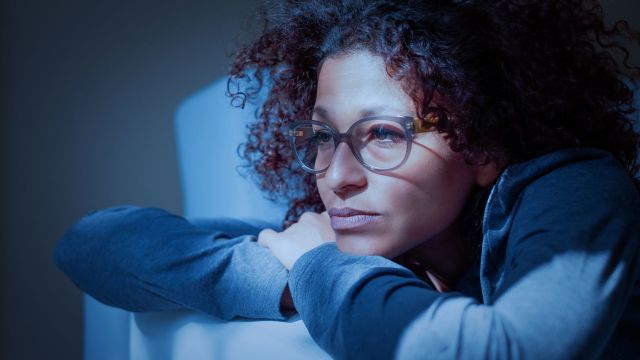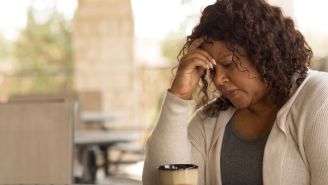Updated on January 31, 2025.
Everyone has nights when it’s tough to fall asleep. But what if you consistently have troubles dozing off? Insomnia occurs when a person has problems falling or staying asleep or getting high-quality sleep. It happens even if they have the time for sleep, or when their environment is suited to good sleep.
Acute insomnia lasts for less than three months at a time. It’s different from chronic insomnia, which lasts for more than three months. About 30 percent of Americans have symptoms of insomnia, according to the American Academy of Sleep Medicine (AASM). Around 10 percent are believed to have chronic insomnia.
Sometimes, tension or anxiety can lead to or worsen insomnia. A person may worry about relationship problems, financial hardships, major life changes, or other troubles to the point it keeps them awake at night.
“These situations are stressful, unexpected and create a lot of uncertainty,” says Teresa Ward, RN, PhD, professor and chair in child, family, and population health nursing at the University of Washington School of Nursing and co-director of the Center for Innovation in Sleep Self-Management.
That’s not all. Just as anxiety can feed into insomnia, insomnia can worsen anxiety. Over time, it may lead to serious health issues.
Why we need to sleep
“Sleep plays a vital role in our body’s ability to heal itself and maintain balance,” says Camilo A. Ruiz, DO, a sleep specialist and member of the American Academy of Sleep Medicine. He notes that proper rest helps our immune systems function, keeps our hormone levels in check, and flushes waste products from our brains.
“Many biological processes occur during the sleep time that keep us healthy and prepare us for the following day,” Ruiz says. “When we don’t partake in that, it hinders the body’s ability to heal itself.”
Sleep also plays a key role in our mental health, says Ward. Lack of sleep is common in those with depression, anxiety, bipolar disorder, PTSD, and ADHD, although it’s not exactly known why. “Although the underlying mechanisms between lack of sleep and mental/physical health are not fully understood, sleep seems to play an important role,” she adds.
Even for those without diagnosed mental health issues, it can be hard to regulate emotions, make decisions, or think clearly when you’ve gotten very little sleep.
What to do about insomnia right now
If you’re having issues falling or staying asleep, try these tips.
Try to keep your daily routines
Even when your life is changing, a schedule can help you feel calmer and more in control. “Routines are important as they help structure our day, our evening, and daily activities,” Ward says. That means going to bed and waking up at the same time every day, even weekends.
Practice good sleep hygiene
Adopting certain habits can help you fall asleep at night.
- Turn off all smartphones, tablets, TVs, and other devices at least 30 minutes before you go to bed.
- Keep your bedroom cool, dark, and quiet.
- Try creating a relaxing bedtime routine, such as reading or taking a shower 30 minutes before you turn in.
- Avoid alcohol and heavy or spicy meals in the hours before bedtime. Avoid drinking coffee and other caffeinated beverages past early afternoon.
Have a worry time
It’s useful to distract yourself with things that make you happy, like watching a funny movie or a comedy on TV. But you should also try designating a worry time each day to help contain distressing thoughts and anxieties.
“Relax, sit back and think about yourself and think about those things that are bothering you,” says Karl Doghramji, MD, medical director of the Jefferson Sleep Disorders Center at Jefferson University Hospitals in Philadelphia.
Make sure this worry time is on your schedule at a specific moment, and is ideally done in a place other than your bedroom. “If you don’t schedule it, the rest of your day will be filled with worries and they may diffuse into your sleep or into other parts of your day,” Dr. Doghramji says.
If you can’t fall asleep, get up
Normally, you should be able to fall asleep 20 minutes after going to bed. But if you’re unable to drift off, get up and leave your bedroom. “Try to sit somewhere with low light and read something simple,” says Ruiz, like a magazine or a physical book—not one on an electronic device. “Hopefully sleep will overcome you and you will go back and sleep,” he says.
Ruiz notes that the same is true if you wake up in the middle of the night. “You don’t want to stay in bed for a half hour because it’s a self-fulfilling prophesy—you become frustrated with the process and frustration furthers insomnia,” he says.
Take care of your mental health
If you already know you have a mental health condition that you feel is being exacerbated, treating that condition can help ease the insomnia. Consult with a therapist or healthcare provider (HCP) for recommendations and remember that teletherapy is also available.
Also talk to an HCP or sleep specialist if your insomnia symptoms worsen, remain persistent, or if they start to interfere with your day-to-day function. They can make recommendations and decide how to approach treatment, so you can get a better night’s rest.







